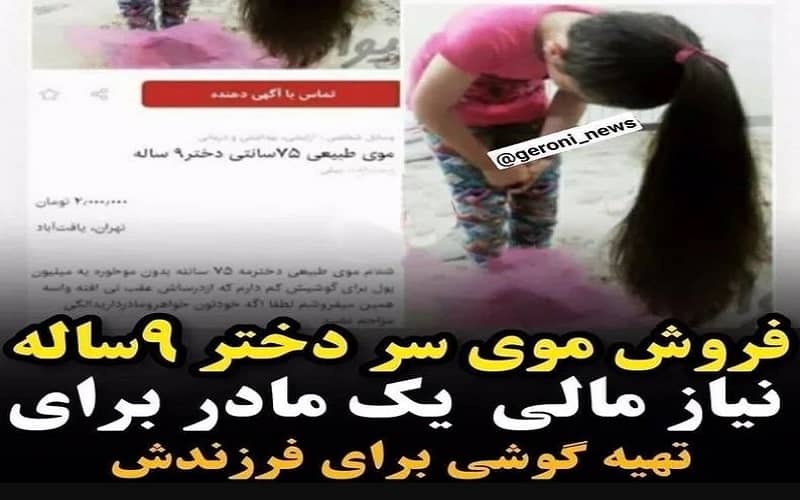
Poverty in Iran, a country with many natural resources and wealth, has become a sad story depicted in many ways, one worse than the other. Below is one of these sad stories. A story of people who are forced to sell their hair to be able to survive the cruel situation in the country created by the selfish and miscreant mullahs.
She ties her hair tightly behind her head, gave tissue to the little Paria, and this time she said in a firm, emotionless tone, ‘If you cry again, I will not buy your hair, then you cannot buy a tablet.’
Paria is eight years old. Her body is so small that she is lost in the mass of her golden hair, sitting on the barber chair she played a nervous bit with her little leg and cries when she hears the last sentence.
Her mother is exhausted, grabs the girl by the shoulders and looks at her sharply, and says to the hairdresser: “No! She is not crying anymore, you cut it short. And makes room for the hairdresser.
Paria grabs a tissue, wipes her tears, and for the last time she moves her hands over her golden hair, finally, she closes her eyes tightly and holds her breath and the rustling sound of the scissors fills the atmosphere of the barber saloon.
Her mother, while staring at the floor mosaics, thinks how she could even explain that to her. With the 2 million tomans gained from Paria and her mother will buy a secondhand tablet for her.
The barber Sudabeh frustrated said: “In the four months since I started shopping for hair, I have seen so much poverty and helplessness of my clients and cleaned so many tears of teenage girls and young people from this chair that I feel depressed. Buying long, thick hair and then selling it to hairdressers who attach it to clients’ hair to keep their hair thick and long for a while is a good profit, but it’s not worth the bad things you must see.”
A 10-year-old girl also sold her hair to buy a cell phone. A 50-year-old woman sold her hair to pay for part of her husband’s medicine, which was thrown from the third floor of a building and is now paralyzed. Another 21-year-old client sold her hair to pay her sister’s married dowry, a 15-year-old girl sold her hair to pay for high school enrollment, these are just a few examples of Sudabeh’s clients in the last two or three months.
Sudabeh then added: “Early on, when I saw my clients’ problems, I paid them more than the real price of their hairs. But the story did not end. More than 80 percent of my clients come from the outskirts of the city or deprived areas of Mashhad, and they are so poor that sometimes they could not care for their hairs, so they have damaged and short hair that cannot be used.”
Soodabeh tells the story of a man who spent a whole week to be able to sell his wife’s hair: “I had told him that I would buy his wife’s 50 cm hair for 400,000 tomans if it was healthy and thick. He worked as a garbage collector while calling and texting me every day. In short, one day I went to their house on North Tabarsi Boulevard. He opened the door with great enthusiasm and laughter. A ruined yard appeared. A thin woman was sitting in a small room and did not speak, her hair was so thin and lifeless that I guessed she suffered from baldness. You do not know what happened when I said that her hair could not be bought.”
The advertisements on the wall say the same story. A 40-year-old woman advertises selling hair and wrote: “I have cut my daughter’s hair; I want to buy something for herself with the money from the sale.”
One of the hair sale ads was put by a 35-year-old woman who wanted to sell her mother’s hair. Masoumeh says that her mother, who is called mother Goli, is about 60 years old, and her only income is the subsidy for herself, her son, and her daughter-in-law, which is not even enough for her diabetes and blood pressure medications, let alone the 2 million Toman ampules of her knees that must be injected periodically so that she can walk, and because of poverty she preferred to forget to walk.